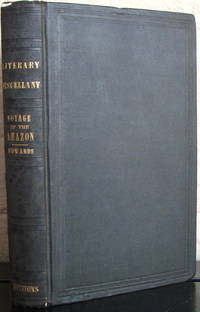
A Narrative of Dr. Livingston's Discoveries in South-Central Africa, From 1849 to 1856. Reprinted by Arrangement from the "British Banner" newspaper.
by [David Livingston / Livingstone]
- Used
- good
- Paperback
- first
- Condition
- Good
- Seller
-
Barcelona, Barcelona, Spain
Payment Methods Accepted
About This Item
"I have nothing to do with [it]. I knew nothing about it." David Livingstone, February 1857
A Narrative of Dr. Livingston's Discoveries in South-Central Africa, From 1849 to 1856. Reprinted by Arrangement from the "British Banner" newspaper. London: Routledge and Co., Printed by Reed and Pardon, n.d. but with a preface dated January 1857. [There is an advertisement for this booklet in the January 10, 1857 edition of The Illustrated London News.]
64 pages with a folding map of central and southern Africa tipped in before the title-page. Original pictorial cover of thick red card with a portrait to the front and advertisement for Routledge's Shakespeare on the reverse.
Card cover with modest signs of wear and a few splits to the spine, particularly the front hinge. Small loss to the spine top and bottom. Small 15mm tear to the inner margin of the map neatly repaired with archival tape. Light foxing to the end-papers and map. Title-page a little soiled. Lower corner of cover and pages very slightly turned. There are 2 black and white stickers on the front cover, possibly a shelf reference number, although there are no ex-libris stamps or marks in the booklet. Pencil ownership initials to the top of the title-page. Whilst a little fragile the binding is intact and holding firm.
This is the first appearance in extended format of Livingstone's activities and discoveries in Central Africa. It is constructed around quoted extracts and summaries from his letters previously published in the British Banner - a liberal weekly Christian newspaper founded in 1847 and closely associated with the non-Conformist missionary movement.
Livingstone wrotelong letters from Africa to the British Banner, Missionary Chronicle, to private friends and others likely to take an interest in his missionary activities and plans. (See, Blaikie, W. Garden DD., LLD. The Personal Life of David Livingstone L.L.D., D.C.L. Chiefly from his Unpublished Journals and Correspondence in the Possession of his Family, London, John Murray, 1880, page 96).
Upon Livingstone's return to England in late 1856 a considerable amount of public interest existed wanting to hear more about his exploits and discoveries, and he was very quickly taken up with speaking engagements. Routledge's publication of this first lengthy account of Livingstone's activities, produced without his agreement and before he had the chance to publish his own narrative, was a very bitter pill for him to swallow. Livingstone had already been made aware earlier in 1856 that the publisher John Murray was eager to publish an account of his time in Africa, but he was only able to begin working on the first draft of a book in late January 1857.
Livingstone's view and feelings about Routledge's actions are evident from his letters of the time.
In a draft letter to the Editor of the Times, dated 25 January [1857], Livingstone denounces attempts by Routledge and other publishers to cash in on his fame, likening them to "hyaenas – low, dastardly, greedy hideous brutes – much given to cowardly filtching". He specifically cites Routledge as out "to get money by false pretences", and he urges the Times to publish his letter so that "every one will soon know that my travels are not published by Routledge & Co." (Lot 99, Bonhams, London, 20 June 2018)
When George Routledge, seemingly intent upon conciliation, visited Livingstone on the 3rd of February 1857 his reception was frosty to say the least. As Livingstone recounted the event to his publisher John Murray, "Mr. Routledge and a Mr. Pardoe called here yesterday morning with the pamphlet, I refused to look at it", telling them "I have abundant evidence people generally believe this narrative is by me tho I have nothing to do with [it]. I knew nothing about it." For his parting coup de grace he tells Murray that he "left them I did not ask them upstairs." (Livingstone, David, 1813-1873. "Letter to John Murray III, 4 February 1857." Livingstone Online. Adrian S. Wisnicki and Megan Ward, dirs. 2021. Web. 28 May 2021.)
Livingstone clearly found this situation distressing. So much so that he considered abandoning writing his own account of his travels, as he explained to John Murray in a letter dated 15 March 1857;
"No case ever so far as I am aware occurred of a missionary's letters being collected and published without any reference to the man himself. They did not I believe become the literary property of either the missionary society or of the British Banner or of any other paper by publication, they had no right to publish them in a collected form but as others are determined to take advantage of my wish to avoid all wrangling and contention I prefer to give up the thing altogether…". (Lot 101, Bonhams, London, 20 June 2018)
The spelling by Routledge of Livingstone's surname as "Livingston" conforms to the then family practice. The Saxon name of the family was originally spelt Livingstone, but David Livingstone's father had shortened it by the omission of the final "e." Accordingly, David Livingstone wrote it in this abbreviated form for many years until about 1857 when, at his father's request, he restored the original spelling. (ibid. Blaikie, page 2).
A scarce and historically significant publication.
This is a high value volume and, as consequence, the shipping cost (using a tracked and signed for service) will be higher than the average quoted in my store listings.
Please contact me if you wish more details.
Reviews
(Log in or Create an Account first!)
Details
- Bookseller
- John Atkins
(ES)
- Bookseller's Inventory #
- 0218
- Title
- A Narrative of Dr. Livingston's Discoveries in South-Central Africa, From 1849 to 1856. Reprinted by Arrangement from the "British Banner" newspaper.
- Author
- [David Livingston / Livingstone]
- Format/Binding
- Original pictorial cover of thick red card.
- Book Condition
- Used - Good
- Quantity Available
- 1
- Binding
- Paperback
- Publisher
- Routledge and Co.
- Place of Publication
- London
- Date Published
- n.d. [1857]
- Size
- 16mo.
- Weight
- 0.00 lbs
- Bookseller catalogs
- Travel and Missions;
Terms of Sale
John Atkins
About the Seller
John Atkins
About John Atkins
All images included with listings are of the actual books in stock.
Glossary
Some terminology that may be used in this description includes:
- Soiled
- Generally refers to minor discoloration or staining.
- Tipped In
- Tipped In is used to describe something which has been glued into a book. Tipped-in items can include photos, book plates,...
- Hinge
- The portion of the book closest to the spine that allows the book to be opened and closed.
- Spine
- The outer portion of a book which covers the actual binding. The spine usually faces outward when a book is placed on a shelf....













![The History of the Life and Actions of Adm[iral] Christopher Columbus and of his Discovery of the West Indies, Call’d the New World, Now in Possession of his Catholick Majesty. Written by his son D. Ferdinand Columbus.](https://d3525k1ryd2155.cloudfront.net/h/226/242/1429242226.0.m.jpg)

